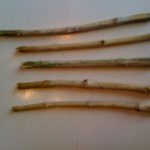
The miswak or siwak (Salvadora persica) comes from the Arak tree that is found in west India and Africa. Miswak sticks were originally used by the Babylonians and are still being used in many countries. Salvadora persica containing mouthrinses have been shown to inhibit cariogenic bacteria and reduced plaque accumulation.
The aim of this review was to assess the effectiveness of Salvadora persica-containing mouthrinses among healthy individuals in comparison to the chlorhexidine mouthrinse) or placebo rinses. Miswak sticks were originally used by the Babylonians and is still being used in many countries. Salvadora persica containing mouthrinses have been shown
Methods
Searches were conducted in the Medline/PubMed, Cochrane Central Register of Controlled Trials, Wiley Online Library, ScienceDirect, and Google Scholar databases. Searches were conducted independently by two reviewers who selected studies, extracted data and assessed risk of bias using the Cochrane tool. Clinical trials and in-vivo studies comparing use of Salvadora persica mouthwash with chlorhexidine and/or placebo were considered. The main outcomes were mean plaque scores and mean cariogenic bacterial counts. Meta-analysis and subgroup analysis were conducted
Results
- 19 studies were included 18 studies contributing to the meta-analysis
- The most common preparation used was a solution containing 7% Salvadora persica extract.
- 7 studies were considered to be high quality the rest of moderate quality.
- Meta-analysis showed that
- Salvadora persica rinses exhibited strong antiplaque effects MD= 0.46 (95%CI; 0.29 to 0.63)
- Compared to placebo Salvadora persica rinses had statistically significant anti-streptococcal MD= -1.42(95% CI; -2.08 to - 0.76) and
- anti-lactobacilli effects MD= -1.12(95% CI; -1.45 to - 0.79)
- However, it was inferior to chlorhexidine rinse MD=0.19 (95% CI; 0.01 to 0.37).
Conclusions
The authors concluded: –
The use of Salvadora persica extract was associated with a significant reduction in the plaque score and cariogenic bacterial count. Although, this reduction was lower than that achieved with the gold standard chlorhexidine mouthwash, Salvadora persica-containing rinse could be considered as a suitable oral hygiene alternative for use in individuals of all ages, socioeconomic backgrounds, and health conditions especially as a long-term measure due to its efficacy, safety, availability, cost-effectiveness, and ease of use.
Comments
The authors have carried out a broad search for studies and 18 out of the 19 included studies were considered to be RCTs. The sample sizes ranged from 10 to 152 and study duration varies from 24 hours to 4 weeks. Some of the included studies were of a cross-over design with wash out periods as short as two days. The short duration of some the studies and the short wash out periods are of concern. The authors’ considered that 7 of the studies were of high quality although 15 of the included studies had domains of the Cochrane tool assessed as being at high risk of bias and only one study was classed as low risk of bias for all 7 domains. While the review suggests that Salvadora persica-containing rinse could be beneficial the quality of the available evidence is very low to low so further high quality well- conducted and reported studies are needs to clarify its effectiveness.
Links
Primary Paper
Jassoma E, Baeesa L, Sabbagh H. The antiplaque/anticariogenic efficacy of Salvadora persica (Miswak) mouthrinse in comparison to that of chlorhexidine: a systematic review and meta-analysis. BMC Oral Health. 2019 Apr 27;19(1):64. doi: 10.1186/s12903-019-0741-5. PubMed PMID: 31029127.
Photo Credits
By Middayexpress – Own work, CC BY-SA 3.0,

[…] post Salvadora persica (Miswak) mouthrinse is it as effective as chlorhexidine mouthwash? Appeared on National Elf […]